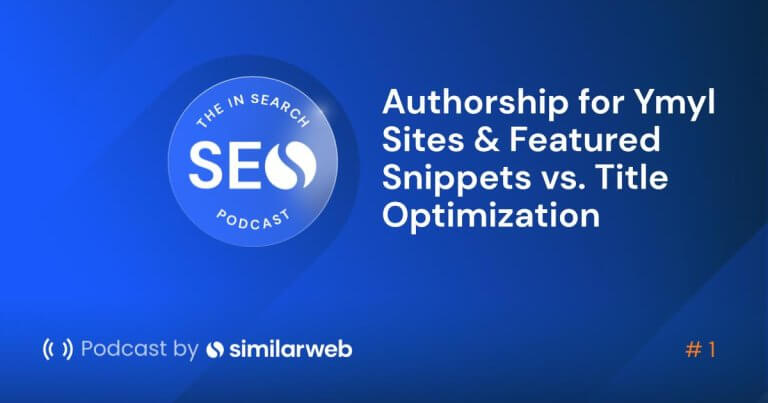 Marketing Intelligence
Marketing Intelligence
In Search Podcast: Authorship for Ymyl Sites & Featured Snippets vs. Title Optimization

In Search Podcast Episode 1 Summary
In this, the first episode of In Search: Making SEO Small Talk, a weekly SEO podcast, we analyze the latest news coming out of the SEO industry, talk tips for creating authoritative authorship when lacking official credentials, and whether or not you should focus first on Featured Snippets or creating highly clickable titles.
Here’s an in-depth summary of the topics our hosts, Mordy Oberstein & Jacqueline Harkham discussed.
Analyzing the Latest SEO News [2:03 – 8:02]
Google Puts its Booking Button Inside the Local Pack: Previously only showing in the Local Panel, now Google is showing its “Booking Button” next to Local Pack results.
Mordy’s Analysis: This is a logical result of Google adding more and more partners to its Reserve with Google program. The question is, will Google ask for a referral fee at some point down the line, much like it does with Google Flights? On the one hand, doing so makes good sense. Conversely, a local business is not a business titan like an airline is, which would make taking a piece of the action a bit more “difficult.”
Penalties Unrelated to Rich Snippets May Result in Rich Result Removal: Google said that a manual action, even if unrelated to rich snippets, could very well mean that the site in question does not show with a rich result.
Mordy’s Analysis: You have to wonder how visible a site that is hit by a manual action is, but it does make a good deal amount of sense to show such a site without a rich snippet. Why would Google want to encourage you to click on a site that’s been penalized by showing ancillary and often attractive information?
Google Throws Activity Settings onto the SERP: Google has made a user’s activity settings available to them right on the SERP.
Mordy’s Analysis: This may be news for us in the SEO industry who harp on every word uttered by Google, but most user’s, or the average user, may not even notice that the option exists within the hamburger menu.
Search Console Sending Slow Page Notifications: Google, via Search Console, has been sending site owner’s notification when they have pages that are considered to be “too slow.”
Mordy’s Analysis: This is a nice move on Google’s part. Certainly helpful, but not something expected from the search engine.
Google Lens Comes to Mobile Image Search: Google Lens has been integrated into mobile image search, allowing you to pick out an item within an image for further research.
Mordy’s Analysis: This update is part of the changes Google announced at their 20th-anniversary event, and shows that Google is actually rolling-out what they announced.
Amazon Advertising Becoming More Popular: A new survey shows that current Amazon advertisers want to increase their ad spend. At the same time, the survey shows that advertisers are moving from search to Amazon.
Mordy’s Analysis: There’s been a lot of debate as to whether or not Amazon is a true competitive threat to Google. One way to look at this is by looking at “momentum.” While Amazon won’t “kill Google off” the platform has all of the momentum in the world behind it. It’s increasingly becoming popular, not only with shoppers but with advertisers. Down the line, whether it be in a year, five years, or 10 years, Amazon will break up the existing duopoly where Google and Facebook reign supreme.
How to Create Authoritative Authorship for Ymyl Sites When Lacking Credentials [8:10 – 13:00]
In our “Content of the Week” we looked at a presentation Marie Haynes gave at a recent Optimisey MeetUp. Marie discussed Google’s Quality Rater Guidelines and some of the recent changes made to them. One of these changes was to authorship. The new guidelines call on raters to look at who wrote an article and if they are an authority on the subject. Interestingly, some have speculated that the recent Medic Update included an analysis of a site’s authorship. A case study we did on site profiling concluded that as well (though, there’s been a bit of debate on the issue per some statements made by Google).
But what do you do when your site’s content team doesn’t have any official credentials? That’s where Marie offered an ingenious tip. If you have personal experience with a topic, or something similar, your author profile should harp on that. If you’re writing about a health condition, and you have personal experience with that ailment, your author profile should reflect that. This way, despite not having any official credentials, you can “tell” Google that the author of this content is an authority on the subject.
Dealing With UX Issues Properly [13:01 – 16:22]
A site’s UX is self-evidently an important element of its overall success. Discussing some of his “SEO pet peeves,” Mordy mentioned that he’s noticed that a lot of site managers, when faced with a legitimate UX issue choose not to deal with it directly. Rather than automatically deal with technical issues that go into a site’s interface, Mordy recommends pausing to see if there is a genuine design issue that needs to be dealt with. That is, before jumping into technical fixes, make sure you don’t have a design issue that’s interfering with how users interact with your site.
Should You Initially Target Featured Snippets or Spend Your Time Creating Clickable Titles? [16:23 – 21:00]
Rank Ranger’s very own founder, Shay Harel, was on hand to partake in a game we call Optimize or Disavow It. Shay was presented with the option of either creating content to target Featured Snippets or working on catchy and solid titles to garner more clicks within the 10 bluelinks. The catch, you have to choose one or the other ….
Shay recommended first making sure your titles are click-worthy. Gaining a Featured Snippet is a nice win, but making sure your titles garner SERP clicks is foundational. It’s also easier. Per Shay, and some initial Rank Ranger research, URLs move in and out of a given Featured Snippet more often than you would think.
In Search Signs Signoff [21:17 – 22:44]
As part of your fun sendoff, our hosts asked what SEO term would you use to name your child? Jacquelin chose bounce rate since her kids are always bouncing around while Mordy chose redirct since he spends a considerable amount of time “redirecting” his four rambunctious boys.
Thank you for joining us and don’t forget to check back next week for an all-new episode!
The #1 keyword research tool
Give it a try or talk to our marketing team — don’t worry, it’s free!






